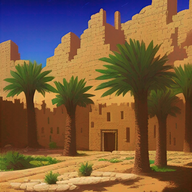A fortified caravanserai stands at the oasis along the trade route between Tyr and Urik. This roadside inn is a preferred stop for many house merchants and dune traders. Its faded, worn walls have greeted travelers for more than a century with flickering lanterns lit just after nightfall, snippets of exotic song, and the clamor of excited trade. Silver Spring Oasis is a great walled square, with the central courtyard open to the elements. The inner wall of the courtyard is riddled with doors that lead to sleeping chambers, a common room, food stores, stables, and vaults where dune traders can safeguard their merchandise. The courtyard also contains the eponymous “Silver Spring,” a central well that yields cloudy, foul-tasting water. (Whoever named the well apparently did so a long time ago, when the water was fresh, or the name might be a joke.) Still, the water is safe for people and mounts to drink, and when properly filtered, it becomes suitable for the famous “silver baths” that only the wealthiest traders can afford. Carts and stalls of minor merchants fill the courtyard around the well. The proprietors are a tribe of elves called the Silver Hands. Unlike others of their kind, the elves are not nomadic herders or raiders; they have run Silver Spring Oasis for several generations. The current leader of the tribe and head of the caravanserai is Chief Toramund, who greets all newcomers, settles all conflicts, and oversees orderly trade.
Those who violate the inn's primary rule (do
not steal from another visitor) are ejected through the gate
without their trade items, belongings, or clothing.
Silver Spring Oasis
A lush field of tart-smelling ash-brush fills the area
around the oasis. The brush is dun-colored and thorny,
and burnt-orange rocks jut from the scrub plains. The
elven compound – a looming fortress of stone blocks
rising above the barrens – can be seen from the road.
When travelers approach to within bowshot of the walls,
elf guards call out the rules of the compound: “Two
silver pieces each to water here and rest in relative safety.
Pay or turn back.” Then an elf appears from a hidden
entrance to collect the fees. The gates will not open until
payment is received, and most violence is returned in
kind by the bow-wielding guards upon the walls.
Inside, the small pond is full of brown, bad-tasting
water. Around it wait the elven tents, full of goods to
trade and deals to be struck. If a traveler is careful and
keeps his wits about him, he might even come away with a
worthwhile item and most of his money. The descriptions
below are keyed to the accompanying map of the oasis.
